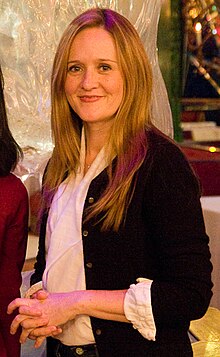Women in comedy
[1][2] Comedy, or creative works with the intention of humor, is thought to have originated in ancient Greek theatre in 425 BCE.
[4] Since then, women have made significant gains in the field, having found fame through stand-up, television, movies, and writing.
[4] Women such as Phyllis Diller, Wanda Sykes, Gina Barreca and many others have contributed to the world of comedy, spanning both time and medium.
[6] Today, feminist comedy draws attention to female issues such as menstruation, rape, gender inequality, beauty norms, and machismo.
[6][7] As a readily acceptable and understandable medium of communication, comedy lends itself to the feminist movement, allowing women's issues to be more widespread in general society.
[12] Additionally, one of the major storylines in the film industry (the romantic comedy), consistently follows traditional female roles, women to searching for a male partner.
[13] Most women comedians in the US extensively use social media to produce comedy content, engage with fans, and influence their press coverage.
A study in 2023 found that 92% use Instagram, 89% use Twitter, only 48% run a YouTube account, and 58% of women comedians host at least one podcast.
[19] The early female figures in stand-up, such as Phyllis Diller, were able to enter the mainstream through their willingness to self-deprecate and declare themselves ugly.
Other early female comedians, such as Mae West and Helen Kane, used sex appeal to attract male audiences.
[20] More modern female comedians cite a need to tailor their comedy to what men would find to be funny, with change in this mentality only coming very recently.
[23] The common perception that women aren't funny pervades all aspects of comedy, including stand-up, television, and movies.
[4][24] Women have experienced everything from heckling audience members calling them gendered terms like bitches or sluts, to being invited to fake comedic festivals (so the organizer could have sex with the female comedian), to being introduced in roasts as the girl that "slept with one of the judges.
"[24] Humor has been used as a tool of feminism both for its ability to point out patriarchy and the structures it creates as well as identify the common female experience.
[6] Divisive humor, or jokes that focus on male structures or male-bashing, do not advance feminism, but rather continue to marginalize females.
[6] Bing continues to say that when humor falls into this inclusive comedy it contributes to feminism by first, contradicting the age old stereotype that women cannot be funny, and second, by undermining the status quo.
For example, the Guerrilla Girls used humor to point out the patriarchal, unchanging nature of the Tony awards, which give the majority of their prizes to men.
[4][6] Outside of the United States, women have been having similar experiences in their attempts to enter field of comedy, colored by their own cultural influences.
She has also faced criticism for her actions, including her choice to not wear the hijab, with people calling her a bad Muslim.
In a country that has deeply entrenched patriarchal values, these female comedians face great amounts of cultural animosity.
[27] Despite this discrimination women such as Aditi Mittal and Neeti Palta have found success in an industry that did not readily accept them.
The show continued in production for over a decade, breaking new ground in comedic material, gaining top ratings, and earning numerous awards.
[22] Jane Curtin was a part of the inaugural class of Not Ready for Prime Time Players on Saturday Night Live in 1975.
[30] In 2008, when asked about the environment at Saturday Night Live, Curtin said that female writers faced an extremely difficult battle, especially when cast member like John Belushi were actively working against them.
[29] Elayne Boosler was one of the few women working in stand-up comedy in the 1970s and 80s and she broke ground by adopting an observational style, that included frank discussions about her life as a single woman, as well as political commentary.
[32][33][34][35][36] Her performance style set her apart from the more self-deprecating humor of female stand-up predecessors such as Joan Rivers and Phyllis Diller, whose jokes often revolved around being a wife and mother.
[7] Her public appointment as the first female head writer of Saturday Night Live placed her in a position to serve as a feminist comedy icon.
[44] Her comedic writing (Mean Girls, 30 Rock, Bossypants, Baby Mama, Date Night etc...), in addition to achieving great public notice, was well received by critics.
Her awkward and clumsy character in the show is an embodiment of all the society neuroses that women face in daily life.
When promoting her 2015 HBO special Schumer appeared on billboards looking rather masculine, with text next to her saying “She’s a lady,” poking fun at the expectations she is supposed to follow both with her looks and personality as a woman.

